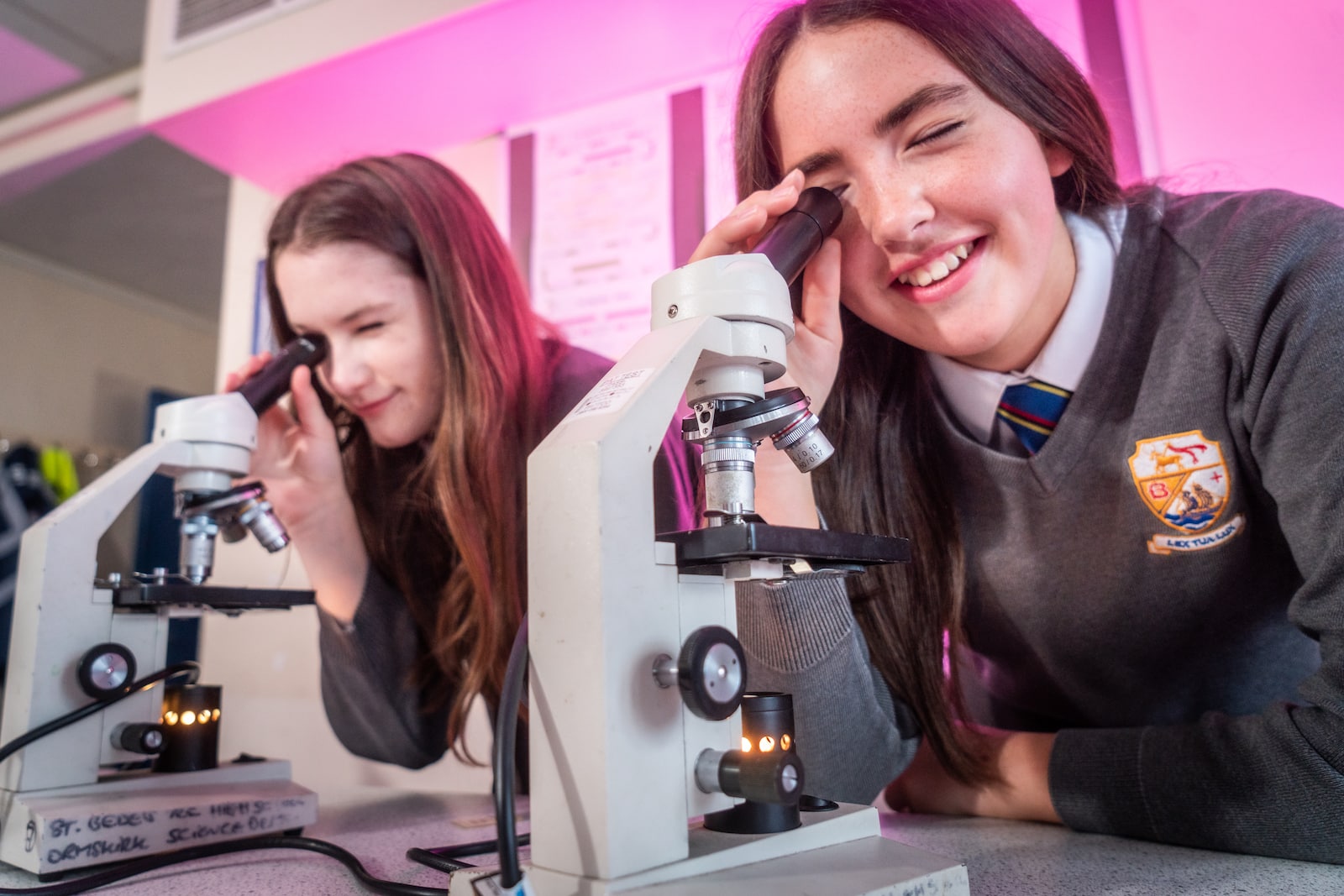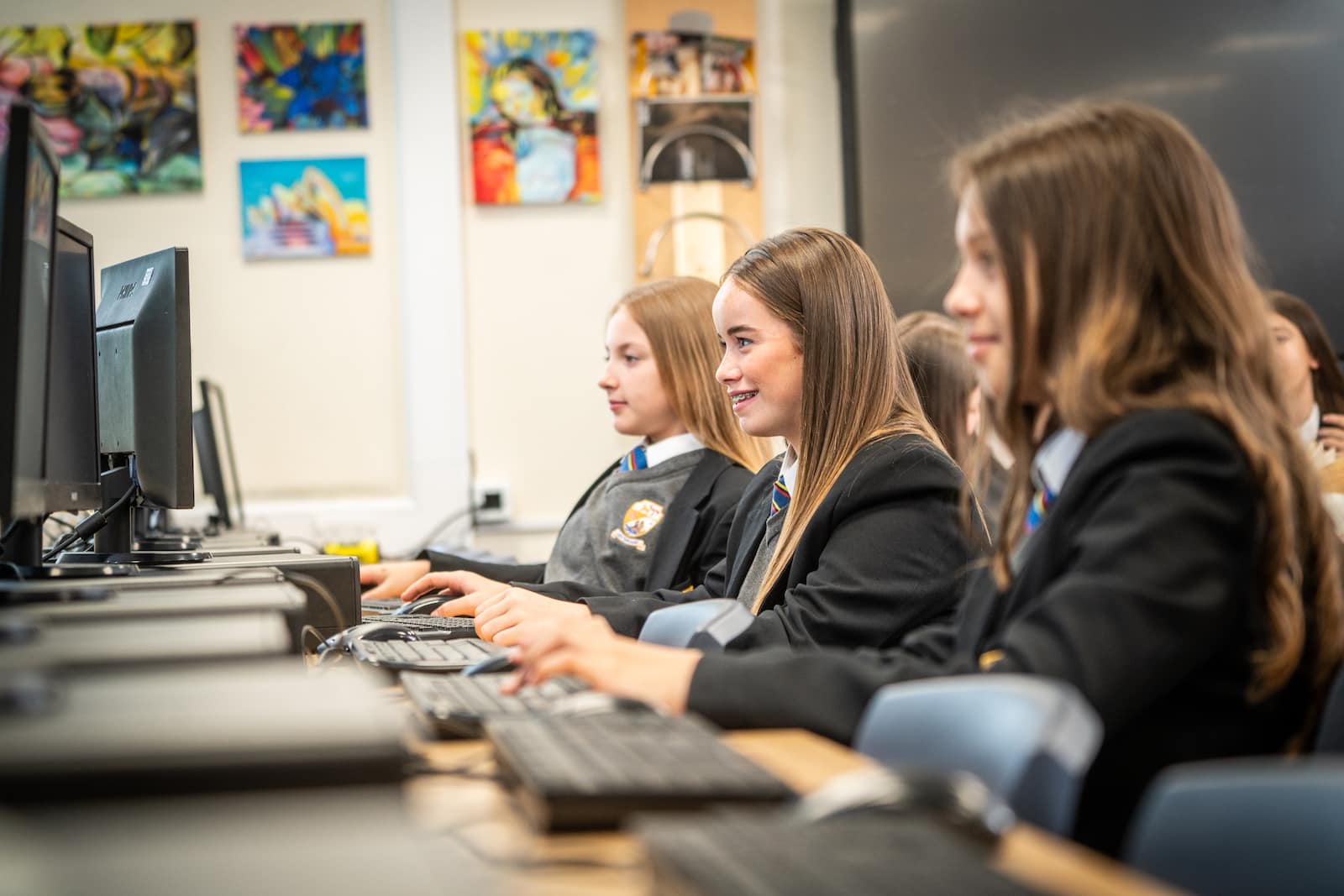As a Catholic school, we share and promote the vision for Religious Education set out by the Catholic Bishop’s Conference of England and Wales. According to Pope St John Paul II, RE is the “core of the core curriculum” in a Catholic school. RE is at the heart of our school community, fulfilling its mission to deliver a transformative Catholic Education that encourages our students to serve the common good. We are committed to ensuring that all our students flourish academically and grow spiritually while developing their God given talents so that they can become the best version of themselves.
During their time with us, students will become religiously literate as they develop the knowledge, skills and understanding of the beliefs, teachings and tradition of the Catholic Church. Students will also be given the opportunity to encounter other World Religions, namely Hinduism, Judaism and Islam, in recognition of the UK as a multifaith and multicultural society. Students should also leave with a clear understanding of the importance of tolerance and respect for other world views and beliefs, recognising the Catholic faith as one that looks outwards and not inwards. We aim to achieve this through the promotion of Catholic Social Teaching to prepare students for adult life so they can make a positive contribution to society.
Inspired by our school mission: “I am the vine, you are the branches. Whoever remains in me and I in him will bear much fruit” John 15:5, we seek to form students that are prepared and willing to live out the gospel values and enable them to enrich our world and help to establish the Kingdom of God through faith, justice and peace, echoing Pope Francis’ words: “I encourage you to not be afraid to dream, to have great ideals, to be builders of hope”. Our hope is that students should also be able to continue their own faith journey as they open up their hearts and minds to a life-long relationship with God.
With Christ as the source and summit of our intentions, we seek to create positive learning experiences, faithful relationships and opportunities to ensure that all students are thriving both academically and spiritually. Students will follow the To Know You More Clearly programme which is a continuation of the primary curriculum as part of the new Religious Education Curriculum directory. The Key Stage curriculum follows six learning branches in each year group:-
- Creation and Covenant
- Prophecy and Promise
- Galilee to Jerusalem
- Desert to Garden
- To the Ends of the Earth
- Dialogue and Encounter
Each branch is explored through different learning lenses that challenge students to ‘hear’ the divine messages of scripture, explore what it means to ‘believe’, recognise how we ‘celebrate’ our faith and ‘live’ out our faith in a modern-day world.
Key Stage Three Assessment
Every assessment process in Religious Education is underpinned by ‘ways of knowing’. The three ways of knowing are: understand, discern, and respond. They are represented in the programme of study by: head (understand), heart (discern), and hands (respond).
Every half term teachers will set three religious language tests, two formative ‘open-book’ assessments which focus on paragraph formation and Quizlet ‘golden knowledge’ homework every two weeks. This information is used to help both the students and teachers understand next steps in learning and how to get better.
Students will complete two summative assessments designed to assess key knowledge, explanation paragraphing and extended writing. These larger, ‘closed book’ assessments take place in January and June.
At KS4, students will journey through the Ed Excel GCSE course were they will build theological knowledge, skills and understanding of Catholic Christianity, Judaism and Philosophy and Ethics.
In light of the new Religious Education Directory, the Key Stage Four curriculum builds religious literacy through continuing learning routines such as beginning topics with sources of wisdom and authority and embedding religious language throughout topical study. The GCSE specification has been tailored to the needs of our students and we sequence content in a personalised way to reflect prior learning.
Year 10
Paper 1 Catholic Christianity September
Paper 3 Philosophy and Ethics
Year 11
Paper 2 Judaism
Revision of full specification
Revision Homework Plan
Year 10
Mock revision plan – four-week plan set before June mock exams
Year 11
Mock revision plan – four-week plan set before November mock exams
Final GCSE revision plan – 10-week plan to support revision for final examinations
Exam board – Edexcel
https://qualifications.pearson.com/en/qualifications/edexcel-gcses/religious-studies-a-2016.html
Past exam papers and mark schemes can be found here
https://qualifications.pearson.com/en/qualifications/edexcel-gcses/religious-studies-a-2016.coursematerials.html#%2FfilterQuery=category:Pearson- UK:Category%2FExam-materials
Key Stage 4 Assessment
Every half term teachers will set three religious language tests, two formative assessments and Quizlet ‘golden knowledge’ homework every week. This information is used to help both the students and teachers understand next steps in learning and how to get better.
Students will complete one summative assessment (past paper questions) at the end of every topic (every half term). They will also complete 3 mock full mock exams in the examination hall.
Catholic Social Teaching is at the heart of our Catholic faith and therefore it is at the heart of Religious Education. We promote the principles Catholic Social Teaching as part of our intention to develop religious literacy so that pupils know how to put these principles into action and build a shared language rooted in these principles. The ‘Live’ learning lenses that are explored towards the end of each Key Stage 3 topic are rooted in examples of CST in action. At GCSE level, pupils apply the principles to their learning as a source of wisdom and authority. Pupils explore Care for Creation through their learning about Laudato si’, stewardship and the Year 7 Live Simply Project. In Year 9, pupils consider dignity of the human person, rights for workers and rights and responsibility by looking at the character and attributes of Malala, Irena Sandler and Dorothy Day. In Year 8, pupils consider Jesus’ commitment to the poor and vulnerable during His ministry whilst Year 9 pupils consider the importance of standing in solidarity with other Christians when they explore the theme of Red Wednesday. The principles of Catholic Social Teaching empower pupils at St Bede’s to take their learning beyond the RE classroom so that they can make a positive contribution to the school and wider communities.
Across the Key Stages we want our students to truly ‘live’ the faith that they are learning about. The curriculum has built in opportunities for students to truly ‘live’ their faith and respond with their ‘hands’. We call this the ‘live out your faith’ programme.
| Age Phase | ‘Live out your faith’ Activity |
| Year 7 | Term 1 – St Bede’s school homework prayer competition, Welcome Retreat Day and visit from parish priest to RE lessons. Term 3 – Live Simply projects including Live Simply Day, liturgical, assembly leadership and parish visits. Term 6 – Hinduism Food, Art & Craft lunch times – planned and led by students. |
| Year 8 | Term 2 – Stealth Stars – Advent messages of joy service project Term 6 – Ormskirk Community Faith Cub competition |
| Year 9 | Term 1 – Mary & the rosary student led liturgical assembly. Term 3 – Finding God in… project competition including an exhibition and a liturgical assembly led by students. |
| Year 10 | Term 2 – Advent assembly leadership based on student learning about the incarnation. Mitzvah Day student led service project focused on interfaith fundraising and advocacy of interfaith action. |
| Year 11 | Term 1 – Lourdes assemblies, fundraising in school and local parishes Term 2 – Advent legacy service project |
The WEB
The RE department runs a fortnightly after school club known as the ‘WEB’ – The Wellbeing and Ethos Committee. The committee is made up of 28 Year 9 and 10 students who are committed to improving student and community wellbeing by putting the principles of Catholic Social Teaching into action and ensuring that the dignity of the human person is central to decision making across the school.
Faith in Action
The Head of RE works closely with the school chaplain in the running of the Million Minutes group and the Faith in Action award. Students in both groups meet weekly during lunchtime.
Interfaith Week
The RE team will be hosting Interfaith Week 2023. This will be a whole school event which will focus on the ‘dialogue and encounter’ thematic learning branch during RE lessons, form times and lunch and after school activities.
Student missions
On the final week of every term, the RE department hosts a special after school mission. This is an optional faith activity that supports students in their faith journey.
Prayer & Scripture
The chaplain works with groups of students in the faith space to create truly spiritual experiences of the ‘hear’ and ‘celebrate’ lenses. All Key Stage 3 classes spend time in our prayer room experiencing prayerful encounters.
Speakers and trips
The RE department works closely with the wider chaplaincy team to plan and deliver the St Bede’s retreat programme to years 7-11 which includes working with inspirational speakers from the Christian community and a Year 9 annual residential retreat to Castlerigg.
As part of our Live Simply Award journey and wider environmental work, CAFOD representatives are invited into school to work with students and staff.
This year, we are inviting the One Hope Project into school to deliver a workshop to all students with leadership responsibilities to provide faith formation with a focus on Catholic Social Teaching and the mission statement.


